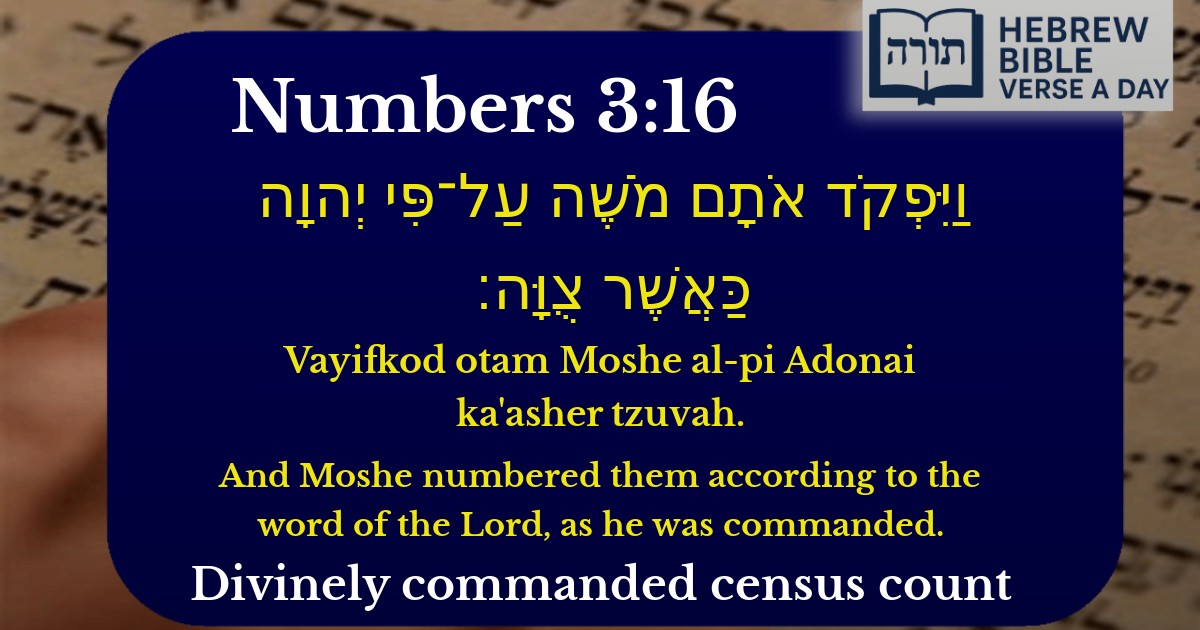Frequently Asked Questions
Q: What does Numbers 3:16 mean when it says Moshe counted them 'according to the word of the Lord'?
A: This verse teaches that Moshe did not count the Levites on his own initiative, but strictly followed Hashem's command (Rashi). It emphasizes the importance of fulfilling mitzvos precisely as instructed, without adding or subtracting.
Q: Why did Moshe need to count the Levites in Numbers 3:16?
A: The Levites were counted separately because they were chosen to serve in the Mishkan (Tabernacle) in place of the firstborns (Rambam, Hilchos Klei HaMikdash 3:1). This counting established their roles in the divine service.
Q: What lesson can we learn from Moshe following Hashem's command exactly in Numbers 3:16?
A: The verse teaches the importance of obedience to Hashem's commandments without deviation. As the Talmud states (Eruvin 100b), 'Greater is one who is commanded and performs than one who is not commanded and performs' - showing the value of fulfilling mitzvos as divine commands.
Q: How does the counting in Numbers 3:16 relate to Jews today?
A: While we no longer count Levites for Temple service, the principle remains that all mitzvos must be performed exactly as commanded. The Midrash (Bamidbar Rabbah 3:16) explains this teaches precision in observing halacha (Jewish law).
Q: What was special about how Moshe counted the Levites in this verse?
A: Rashi explains that Moshe counted them by having each person pass before him, showing individual importance. Unlike regular censuses where coins were used (to avoid ayin hara), here direct counting was commanded - highlighting the Levites' sacred status.


Context of the Verse
The verse (Bamidbar 3:16) describes Moshe's fulfillment of Hashem's command to count the Levites. This follows the earlier directive (Bamidbar 3:14-15) to tally the tribe of Levi separately from the rest of Bnei Yisrael. The counting was part of establishing the Levites' role in the Mishkan service.
Rashi's Explanation
Rashi emphasizes that Moshe acted precisely "according to the word of the Lord" - he didn't deviate in the slightest from what he was commanded. This teaches us about Moshe's complete fidelity in executing divine commandments. Rashi notes this is characteristic of Moshe, who is described elsewhere (Bamidbar 9:23) as doing exactly as Hashem commanded.
Rambam's Perspective
In Hilchos Klei HaMikdash (3:2), Rambam derives from this verse that the appointment and counting of Levi'im must be done specifically by a prophet or someone of equivalent stature (like Moshe). This establishes an important halachic principle about who is qualified to assign sacred roles.
Midrashic Insights
Theological Significance
The repetition of "as he was commanded" underscores the Torah's emphasis on precise obedience to divine will. The Malbim explains that this teaches that even great leaders like Moshe must follow commandments exactly, without adding or subtracting.
Practical Lessons